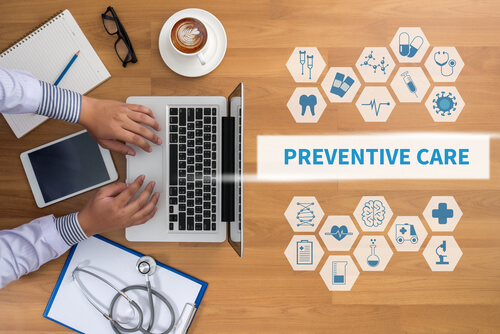
We are all in a rush to get to places, meet deadlines and escape long queues. In the constantly hurried pace of life, we tend to ignore a healthy lifestyle that keeps us at bay from preventable diseases.
Preventive care comprises of everything from frequent health check-ups to screenings and immunizations and in today’s times, is an absolute necessity. Let us explain why.
A huge increase in incidences of disease
Our deteriorating lifestyle and lack of attention to food, has led to a meteoric rise in preventable diseases over this decade. A report published by the Indian Council of Medical Research has estimated that the proportion of all deaths due to non-communicable diseases (NCDs) rose from 37.09% in the past decade to 61.8% in the current decade.
Nearly 14.2 million people between the ages of 30-69 years across the globe die prematurely every year from lifestyle-related diseases like heart attack, diabetes, and high blood pressure. If you look at the statistics, some of these diseases have emerged as more fatal than hereditary or infectious diseases.
Moreover, nearly 65 percent of health expenditure in the country is out-of-pocket, and such expenditures push approximately 57 million people into poverty each year.
A huge rise in costs of treatment
The cost of treating critical illnesses like cancer is high, especially considering the rising medical inflation in the country. As per the data by the World Health Organization, more and more people are dying every year due to cancer, with the number touching 9.6 million in 2018. With treatment costs higher than ever before, cancer patients would have to pay a hefty price for everything from surgery of the affected part to chemotherapy.
Maintaining healthy habits and attending frequent check-ups can safeguard us against a number of diseases that can burn a big hole in your pocket - besides the mental and physical strain. Besides maintaining a healthy lifestyle, finding out and treating a disease is also an important part of preventive healthcare. We are all aware of the range of diseases which can be nipped in the bud if diagnosed well in time. So, educate yourself about illnesses and their symptoms, and be attentive towards your body and its symptoms and visit your doctor on a regular schedule. If detected soon enough, a full cure is much more likely in many cases of critical illnesses.
Considering these harsh statistics, it is a no-brainer that having a comprehensive health insurance policy with adequate add-on covers is an essential part of planning for one’s future. Investing in a health insurance plan must be the priority investment before one starts investing to fulfill one’s long-term goals. Given the rising incidence of critical illnesses like heart attack, cancer, renal failure etc., it is prudent to invest in a critical illness plan as well. A standard health insurance policy is restricted to hospitalization expenses and does not include associated treatment or rehabilitation costs. Critical illness policies bridge that gap. It gives, to the insured, a lump sum amount upon the diagnosis of the covered critical illness. The payout is independent of the proceeds from the regular health insurance policy as a critical illness insurance policy comes as a rider. So you can claim your critical illness benefits, in addition to your health insurance policy claim.
Besides planning well in advance by investing in a critical illness policy, these startling numbers also enunciate the need for preventive healthcare. Eating a well-balanced diet, exercising regularly and quitting destructive substances like tobacco, alcohol and excessive amounts of sugar and salt are crucial ways of preventive healthcare.
Think of preventive care as an investment or personal insurance, keeping your retirement nest egg as your return on the investment. You should make use of any preventive benefits that your insurance company offers. The insurance providers cover preventive medical expenses as the statistics of preventive healthcare indicate that it is also in the interest of the company to provide preventive healthcare cost rather than spending on a critical illness. Moreover, as more insured citizens start practising preventive healthcare, it would benefit the entire country at large. By the same token, when there are too many cases of critical illnesses, there is a more significant burden on the entire healthcare system of the country. This, in turn, leads to higher healthcare costs, higher medical taxes, poorer services etc.
Therefore, while it is imperative to switch to a healthier lifestyle, it is also equally important to protect ourselves and our family with a good health insurance policy with adequate critical illness cover. This will ensure that in the eventuality of a critical illness, the rising bills do not come in the way of quality treatment.


Comments